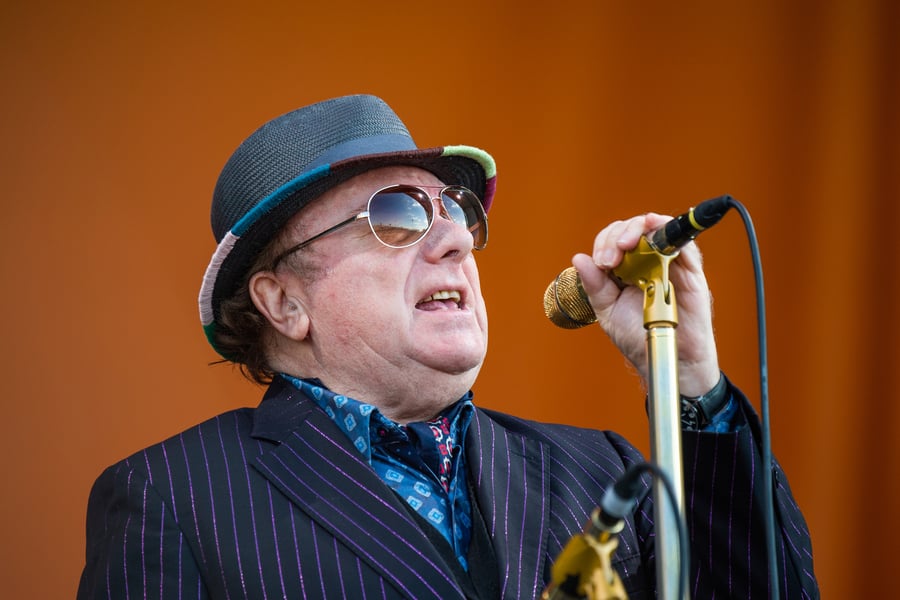“Reason doesn’t walk in,” Van Morrison sang eight years ago. “Passion’s everything, when you were born to sing.” That line is from the title track of Morrison’s Born to Sing: No Plan B, an album whose name, in light of the singer’s recent tirades against government restrictions on live music during a deadly global pandemic, now feels mildly threatening. The implication of the 2012 soul-jazz ballad is that to be a committed artist is to have your life’s calling constantly being jeopardized. Being “born to sing,” Morrison notes in the song, “comes with a sting.”
It’s hard not to hear Van Morrison’s new song, “Born to Be Free,” the first in a series of what Morrison has described as “protest songs against lockdown,” as merely the singer’s latest in his long line of screeds (“Why Must I Always Explain,” “Too Long In Exile,” “How Can a Poor Boy?”) about outsiders preventing Van Morrison from making music in the way Van Morrison wants to make music — in this case, in non–socially distanced, full-capacity venues.
“Don’t need the government cramping my style,” Morrison sings over a jarringly cheery country-soul arrangement on “Born to Be Free.” “Give them an inch/They take a mile.”
Substitute “government” with a vague allusion to the larger music industry or Morrison’s past record labels, and “Born to Be Free” could fit in comfortably on nearly any one of the singer’s records from the past 30 years. Its sentiments are nothing new from an artist who, 17 years ago, sang the following on 2003’s “What’s Wrong With This Picture?”:
You can’t believe what you read in the papers
Or half the news that’s on TV
Or the gossip of the neighbors
Or anyone who doesn’t want you to be free
Since at least the early Nineties, vague grievance has been one of Van Morrison’s most reliable and comfortable modes, and the singer has indulged in his fair share of conspiracy-mongering during the latter half of his career. “They sold me out for a few shekels,” Morrison sang on 2005’s cranky ballad “They Sold Me Out.”
“They’ve brainwashed the suckers again and perpetrated the myth,” he sang three years later, on 2008’s “School of Hard Knocks,” “propaganda far and wide.”
Love Music?
Get your daily dose of everything happening in Australian/New Zealand music and globally.
Even so, the first offering from Morrison’s conspiratorial Covid-19 collection feels stranger, or at least even more frustratingly obtuse, than usual. It’s unclear what the singer means when he sings, “Some kind of new, old ideology/Running tandem with a weird kinda psychology” on the new song. The chorus of “Born to Be Free,” meanwhile, is, bafflingly, fixated on whether or not people still remember the Berlin Wall.
Morrison has always typically avoided politics, in both music and in interviews, but the singer has recently expressed his dissatisfaction with the United Kingdom’s government’s ineptitude on 2019’s “Nobody in Charge,” which he said at the time was “about Brexit.”
This also isn’t the first time Morrison has sang about infectious disease. The Belfast singer’s 1967 track “T.B. Sheets” was a nine-minute tortured blues vamp about watching a loved one wither away from tuberculosis. That same year, Morrison recorded a ditty called “Ring Worm,” part of a larger collection of intentionally irreverent mini-songs intended to free him from his oppressive first record contract. “It’s a very common disease,” he sang. (Another song from those sessions, “Blow in Your Nose,” riffed on Blowin’ Your Mind!, the title of his first album, released by his producer Bert Berns without his consent.)
Morrison has announced that he will be donating the profits he earns from his three anti-lockdown songs to musicians who have suffered financial hardship during the global pandemic through his Van Morrison Official Belfast Rhythm and Blues Foundation.
But despite Morrison’s charity, the legend’s latest mainly sounds like the most recent iteration of his own insular distrust for any person or institution he sees as getting in the way of his own art. It’s an anxiety that’s become even more pronounced as Morrison has grown older: The next album of original material he released after 2012’s Born to Sing: No Plan B was titled Keep Me Singing, its title sounding like an uneasy plea, with Morrison entering his eighth decade, as much as it was a defiant mission statement.
“Born to Be Free,” too, ultimately says more about Morrison’s own blinding mistrust than anything else. It just so happens that this time, Morrison’s preferred method of venting might also cause harm to others.
From Rolling Stone US



































